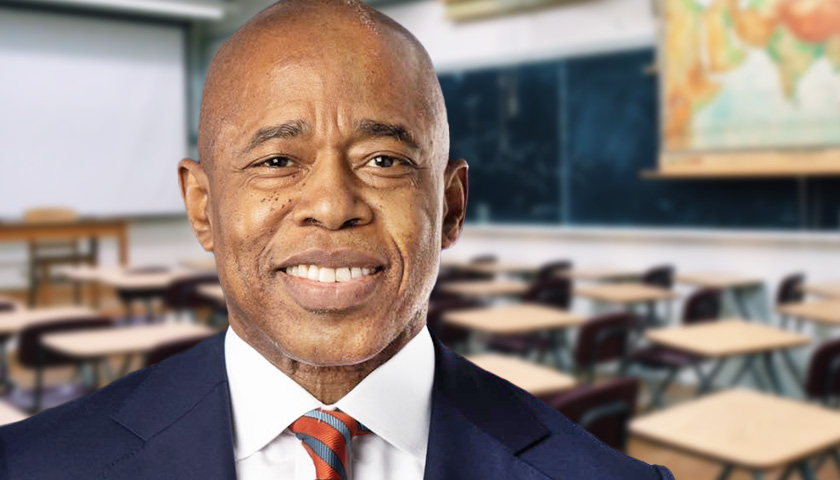New York City public schools are expected to lose nearly 30,000 students by this coming academic year, says the city’s Department of Education Office of Student Enrollment, according to the New York Post.
Data from the department show 28,100 fewer students are expected to enroll in city public schools this fall, with another 2,300 fewer students by the end of the academic year, the Post noted, adding, “By the end of next school year, the largest school district in the nation expects to serve a student population of just 760,439 children, the data show.”
According to the report, the data pointing out the massive decline in student enrollment is for all geographic district schools – though it excludes students enrolled in charter schools, specialized schools for disabled children, and other nontraditional programs that are funded by public dollars.
New York City Mayor Eric Adams (D) told angry protesters from Manhattan’s Upper West Side last week that substantial budget cuts to public schools are due to plummeting student enrollment.
“We have a massive hemorrhaging of students – massive hemorrhaging,” the mayor said, according to the Post. “We’re in a very dangerous place in the number of students that we are dropping.”
Close to 1,200 New York City schools are seeing cuts to the primary source of their individual budgets through the Fair Student Funding (FSF) formula, according to New York City Comptroller Brad Lander, who testified June 24.
“[T]he basic fact … is this: 1,166 schools are receiving cuts to their core FY23 budgets, for an average of $402,456, adding up to a total of $469 million,” Lander said, continuing:
[W]ith broader enrollment decline, FSF has primarily become a formula for cutting resources to schools. Many more schools, 1,166 schools across the city (approximately 77%), are receiving cuts from their FY22 to FY23 budgets, for total cuts to individual school budgets, based on the FSF calculations, of $469 million.
That’s an average FSF cut of $402,456, which on average is 8% of individual school budgets. Roughly 450 schools have cuts exceeding 10% of their budgets. Dozens of schools are seeing cuts of over $1 million. This type of dramatic decrease is not something individual schools can absorb in one year without drastically impacting the essential services and supports students receive.
In March, New York City Schools Chancellor David Banks noted about 120,000 students have abandoned the city’s public schools over the past five years.
“For our schools to deliver on their original promise of serving as the engine of the American dream, we will need to do things very differently in ways that build trust one big step at a time,” said Banks, urging the public school system to connect students with the “real world” and “what matters to them,” and to welcome parents’ participation.
“It is the biggest complaint that I’ve heard since I started as chancellor – parents have felt unheard and disrespected,” he said, the Post reported.
Randi Weingarten, president of the American Federation of Teachers (AFT), asserted her assessment of the concerns of families of school-age children at AFT’s convention.
“Our delegates and committees put in the work on the issues keeping families up at night, from climate change, to accessible health care, to the crushing crisis of student debt, to the terrifying safety issues plaguing too many workplaces,” Weingarten said. “This year was an important reminder of the AFT’s foundations in democracy and our commitment to union work: to stand up and be counted, to live our convictions, and to engage and not withdraw.”
Our delegates and committees put in the work on the issues keeping families up at night, from climate change, to accessible healthcare, to the crushing crisis of student debt, to the terrifying safety issues plaguing too many workplaces. https://t.co/PTrGHKl7XM
— Randi Weingarten 🇺🇦🇺🇸💪🏿👩🎓🟣 (@rweingarten) July 18, 2022
According to the Post‘s report, Rita Joseph of District 40 in Brooklyn, head of the city council’s education committee, attributed the plunge in enrollment to schools’ environments.
“You want to bring them back, but the environment has to also be inviting,” she said. “Most of them look like jails. They said the colors are terrible, the settings are horrible.”
But, a Gallup poll released Thursday found only 28 percent of Americans have either “a great deal” or “quite a lot” of trust in U.S. public schools, down 4 percentage points from last year’s 32 percent, and a drop from 2020’s 41 percent.
Republican confidence in public schools has plummeted from 34 percent in 2020, to 20 percent in 2021, and now to 14 percent in the most recent survey.
Democrats’ trust in public schools has dropped to 43 percent since 2020, when it was 48 percent.
Independent voters’ confidence in public schools has also declined from 38 percent in 2020 to 29 percent in 2022.
A survey released in June 2021 by Competitive Edge Research for Parents Defending Education found the majority of American voters oppose teaching the concepts of Critical Race Theory (CRT) in schools.
Results revealed Americans overwhelmingly hold favorable views of the Founding Fathers (81.7 percent), Abraham Lincoln (89.4 percent), and Martin Luther King, Jr. (92.1 percent).
Of those surveyed, 69.7 percent said they do not think schools should teach children that their race is their most important quality, as opposed to 24.7 percent, who said they should.
When asked if they believe schools should teach white people are “inherently privileged” while black people are “inherently oppressed and victimized,” 73.7 percent of respondents said they should not. Only 9.3 percent “strongly believed” this primary concept of CRT should be taught in schools.
An overwhelming majority of respondents (84.3 percent) also rejected students being assigned “privileged” or “oppressed” status according to their race. Only 5.7 percent said schools should teach that concept.
Of those surveyed, 68.7 percent said schools should not teach students “America was founded on racism and remains structurally racist today,” and that “racism is the cause of all differences in outcome and achievements between racial groups.”
– – –
Susan Berry, PhD, is national education editor at The Star News Network. Email tips to [email protected].
Photo “Eric Adams” by Mayor Eric Adams. Background Photo “Classroom” by Wokandapix.





